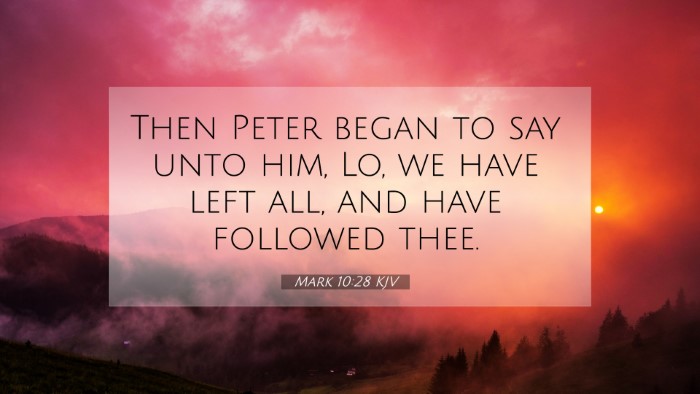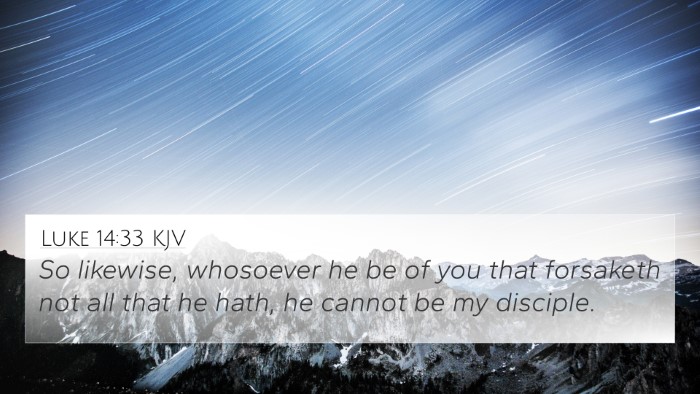Understanding Mark 10:28
Verse Context: Mark 10:28 states, "Then Peter began to say unto him, Lo, we have left all, and have followed thee." This verse captures a moment of reflection by Peter, showcasing the commitment of the disciples in their dedication to Jesus.
Summary of Meaning
This verse illustrates the theme of sacrifice and devotion in the Christian faith, highlighting the commitment required to follow Christ. Peter’s declaration serves as an acknowledgment of the sacrifices made by the disciples and prompts a discussion on the rewards of following Jesus, as revealed in the surrounding verses.
Insights from Public Domain Commentaries
- Matthew Henry: Henry emphasizes the significance of Peter's words, underlining a principle that following Christ involves leaving behind worldly pursuits and comforts. He highlights that true discipleship demands a total commitment, which Jesus acknowledges and rewards.
- Albert Barnes: Barnes discusses the notion of loss and gain. He notes that while the disciples left their homes, families, and occupations, the return on this investment in faith is far greater, as they would receive spiritual blessings and eternal life.
- Adam Clarke: Clarke focuses on the implications of their sacrifices in a broader theological context. He interprets Peter’s statement as a representation of the Christian’s overarching need to prioritize the kingdom of God over earthly ties.
Thematic Connections
Mark 10:28 aligns with several key themes throughout the Bible, illustrating the profound nature of discipleship. Below are key biblical themes and parallels that interconnect with this verse:
- Sacrifice: A recurring theme across the Scriptures, emphasizing that commitment often requires leaving behind earthly attachments (Matthew 16:24).
- Reward for Faithfulness: The promises of rewards for those who forsake worldly things for the sake of the Gospel (Luke 18:29-30).
- Cost of Discipleship: Jesus makes clear that following Him demands substantial sacrifice (Luke 14:26).
- Faithfulness Throughout Trials: Endurance in faith through trials yields divine reward (2 Timothy 4:7-8).
Cross-References for Mark 10:28
In exploring the connections between Bible verses, we find numerous references that deepen our understanding of the sacrifices associated with following Christ. Below are some relevant cross-references:
- Matthew 19:27 - Peter’s question concerning what they will receive for their sacrifices.
- Luke 18:28-30 - Expands on the rewards for those who leave everything for the sake of the kingdom.
- Mark 8:34 - Jesus’ teaching on the necessity of self-denial to follow Him.
- Philippians 3:8 - Paul’s perspective on considering all things as loss for Christ.
- Romans 12:1 - The call for believers to offer their lives as living sacrifices.
- Revelation 2:10 - Encouragement to be faithful, with promises of a crown for the faithful.
- 1 Peter 5:4 - The promise of the Chief Shepherd rewarding faithful leaders and followers alike.
Connecting Various Scriptures
Understanding Mark 10:28 encourages a thorough exploration of the thematic Bible verse connections. Through cross-referencing, believers can see how various scriptures relate and deepen understanding. Here are some tools that may aid in this exploration:
- Bible Concordance: A vital resource for identifying connections.
- Bible Cross-Reference Guide: Helpful in tracing thematic connections.
- Cross-Reference Bible Study: Engaging in comparative analysis of the scriptures.
- Inter-Biblical Dialogue: Reflects on how different books within the Bible converse with themes of sacrifice and reward.
Final Thoughts
The call to discipleship is both a challenge and a promise. Mark 10:28 reflects the heart of Christian commitment, reminding believers of the value of spiritual investments. Through understanding interconnected scriptures, one can deepen their faith and see the comprehensive narrative of sacrifice and rewards found throughout the Bible.
Further Exploration
For effective cross-referencing and further study, consider resources that offer verse connections, tools for in-depth exploration, and methods for comparing the teachings across different parts of the Bible, such as:
- Identifying connections between Old and New Testament.
- Conducting a comparative study of Pauline epistles.
- Exploring cross-referenced themes in the Bible and how they relate to everyday faith and practice.









